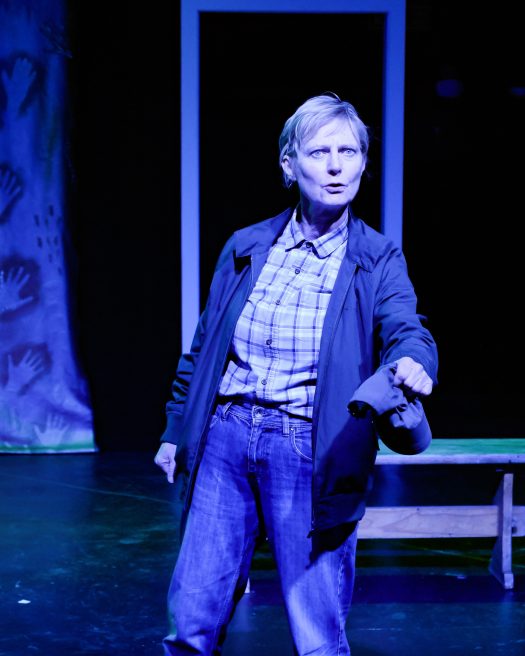
BAH Humbug! The Christmas spirit is taking over the Grand Opera House, York, from Tuesday and not even Ebenezer Scrooge can stop it.
York company Pick Me Up Theatre are presenting their big winter show, Scrooge The Musical, directed by Robert Readman, with choreography by Iain Harvey and musical direction by Sam Johnson.
Quick refresher course: based on Charles Dickens’s Victorian cautionary tale A Christmas Carol, Scrooge tells the tale of old miser Ebenezer Scrooge on the night he is visited by the ghosts of Christmas Past, Present and Yet To Come.
Can he be turned from sourpuss to saint? What will happen to Tiny Tim? Will everyone have a merry Christmas after all? “Come and find out in this all-singing, all-dancing, all-flying show,” invites Robert.
His cast will be led by Pick Me Up regular Mark Hird, fresh from directing this autumn’s musical, Monster Makers, at 41 Monkgate. He now adds Scrooge to a diverse CV that includes Captain Mainwaring in Dad’s Army, Colonel Pickering in My Fair Lady and Uncle Fester in The Addams Family.
Further leading roles go to Rory Mulvihill as the jolly Ghost of Christmas Present and Alan Park as Scrooge’s long-suffering clerk Bob Cratchit.
“It started out as a film musical in 1970, adapted for the screen by Leslie Bricusse, with Albert Finney as Scrooge,” recalls Mark. “But it was one of those musicals that landed at an unlucky time just as film musicals went out of fashion.
“Everyone thought it was an absolute banker, but times and tastes change, but now, when you go back to it, it’s actually a really good film.
“So, 22 years later, Leslie Bricusse decided to turn it into a stage musical, wrote half a dozen new songs, written specially for Anthony Newley’s Scrooge, and it went down incredibly well.”
Alan Park chips in: “Then it became a vehicle for Tommy Steele for many years in Bill Kenwright’s productions. Each year, Robert Readman put in a request for the performing rights, and at last, this year he got a ‘Yes’.
“So, this must be the first time it will have been done in a theatre of this size without it being a Bill Kenwright show.”
Park and Hird believe that Bricusse’s songs are vital to the show’s success. “They provide the vehicle for you to discover more about the characters beyond Scrooge, like Bob, so that by the end of a song you know more about them,” says Alan.
“You get the inner thoughts of the characters in the songs, so you get more than 2D characters,” suggests Mark. “You really see Scrooge’s progression, through his songs, for example.

“You’re also quite surprised by the sheer variety of the songs and the music, with some big set-pieces.”
“There are some proper Cockney knees-up songs,” says Alan.
“But also some lovely ballads, like when Scrooge sees the only girl he ever loved as a young man, Isabel, his fiancée,” rejoins Mark. You go back in time and you hear her singing this gorgeous ballad with Young Scrooge called Happiness, as old Scrooge looks on.”
“The way Robert has staged it, you have Young Scrooge and old Scrooge mirroring each other’s actions, so you kind of feel like Isabel is singing it to old Scrooge,” says Alan.
Picking up his earlier point about Scrooge’s character progression, Mark says: “Through his songs, Scrooge goes from his position of denial, saying how he hates Christmas, to feeling ‘it’s not my fault, fate has done this to me’, when confronted by the Ghost of Christmas Past.
“Then, with the Ghost Of Christmas Present, he starts to think, ‘Could there be a better life?’, so it’s a fantastic story arc and a fantastic set of songs, with one of the most perfect stories ever written to hang it all together.”
A Christmas Carol has been interpreted in myriad ways on screen and stage, even by The Muppets puppets in 1992 in The Muppet Christmas Carol “My five-year-old daughter is still convinced I’m playing a frog in Scrooge, because her exposure to A Christmas Carol is seeing Kermit playing Bob Cratchit in the Muppets’ movie!” says Alan.
Assessing the abiding popularity of Dickens’ tale, Alan says: “It’s not just about redemption. We all reflect on moments in our life, wishing we could have done things differently, and the story also taps into nostalgia and regret and worrying about things.
“Watching this story unfold, it can change your perspective on the world and who you are.”
Mark adds: “It also says it’s never too late to turn over a new leaf and never too late to start again.”
“The story is full of joyful moments that are infectious, even infecting Scrooge, so I do feel it’s a feelgood show,” says Alan. “If you’re looking at a wider point, we all tend to focus on what’s getting us down, but this story lets us step out and think about all the joyful things of Christmas.”
Mark concludes: “There’s probably no better show to put you in a good mood for Christmas.”
Pick Me Up Theatre’s Scrooge The Musical runs from November 26 to December 1 at Grand Opera House, York. Box office: 0844 871 3024 or at atgtickets.com/york.
Copyright of The Press, York
























